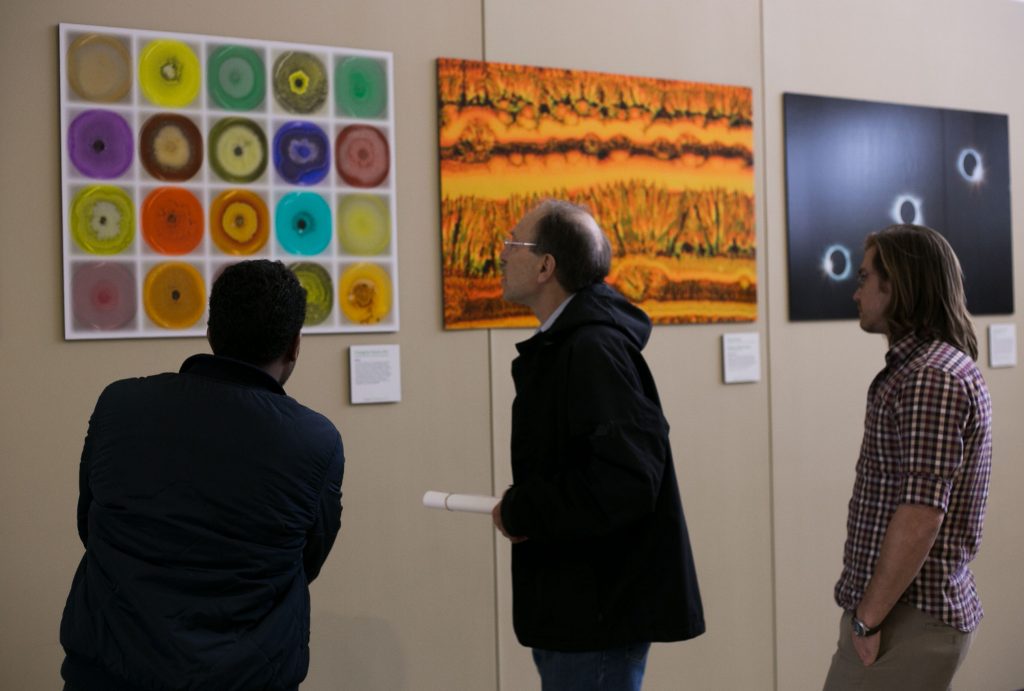
Binghamton University’s seventh annual Research Days kicked off Wednesday and will continue throughout the week, showcasing student and faculty research from multiple departments.
The annual program features various presentations and panel discussions, including ”Crossing Disciplinary Boundaries: Signature Projects from Binghamton’s Transdisciplinary Areas of Excellence.” The panel featured projects of the Transdisciplinary Areas of Excellence (TAE), five thematic research groups on campus and two new transdisciplinary working groups.
Panelists included M. Stanley Whittingham, distinguished professor of chemistry, materials science and engineering at BU; Grace Wang, SUNY interim provost and vice chancellor for research and economic development; and Susan Bane, professor of chemistry at BU, each of whom spoke about a cross-disciplinary research topic pertaining to their field of study. The panel was moderated by Valerie Imbruce, director of the BU Undergraduate Research Center and chair of the Research Days Committee.
Other events will include presentations from BU graduate students and faculty on topics ranging from engineering to art history, honoring this year’s theme of boundary-crossing.
The capstone of the program is a student poster session on Friday, where both graduate and undergraduate students will present their research. It is expected to be the largest poster session in the program’s history, with 341 students set to showcase 175 posters, 50 more than last year’s session.
Rachel Coker, director of the Office of Research Advancement, was one of the staff members behind the planning of the event.
“We want faculty, students and staff to feel connected to those activities and to have opportunities to share their work at ‘home’ in Binghamton, not just at conferences and meetings out of town,” Coker wrote in an email.
Pamela Mischen, chair of the Sustainable Communities TAE and associate professor of public administration at BU, addressed the topic of poverty at Wednesday’s panel. Mischen said ransdisciplinary collaboration is important for her research.
“[Cross-disciplinary research] has created a culture of collaboration on campus,” Mischen said. “We learn how to collaborate from each other. I’m really happy to be on this campus learning how to work across disciplines.”
Following the panel, a faculty-student mixer was held for the Center for Collective Dynamics of Complex Systems (CoCo). According to Hiroki Sayama, director of the center and a professor of systems science and industrial engineering at BU, CoCo focuses on the process of conducting research rather than research topics themselves, and because of this, the Center doesn’t selectively focus on any particular domain.
“Instead of breaking things down and trying to understand every piece of it, which is more like a traditional scientist’s approach, we want to provide a complementary way of understanding the world by considering how two concepts are linked to each other,” Sayama said. “That is the key idea of complex systems.”
Upcoming Research Days events include “Amorphous: A Graphic Exploration of Glass,” an exhibition in the BU Art Museum held by the Material and Visual Worlds TAE, and “Help Us Help You Help Them: Library Support for Student Research,” an informational session about library resources students can use for research projects and a panel discussion in the middle of the student poster session, where the presenters will discuss their research and its impact on their lives.
Imbruce said she is excited to put on a program that showcases the research being done at BU.
“Sharing one’s work is the hallmark of research, it is how knowledge grows and builds upon itself,” Imbruce wrote in an email. “We think we’ve put together an exciting program that we hope will open minds and create pride in what we, at Binghamton, can do.”


